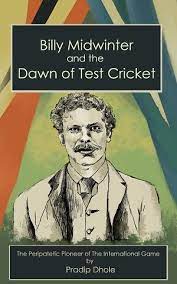Billy Midwinter and the Dawn of Test Cricket
Martin Chandler |Published: 2021
Pages: 139
Author: Dhole, Pradip
Publisher: CricketMASH
Rating: 3.5 stars

The name of Billy Midwinter is, apart from those of Charles Bannerman and, possibly, Jack Blackham, the best known amongst the men who represented Australia in the inaugural Test back in 1877. The honour of being the first bowler to take five wickets in an innings can never be taken away from Midwinter nor, it seems inevitable, will anyone ever match his other distinction, that of being the only man to have played Test cricket for England against Australia as well as for Australia against England.
Those two facts apart, and a not very detailed knowledge of the incident during the 1878 Australian tour of England when WG Grace ‘kidnapped’ him, I did not embark on what I believe to be Pradip Dhole’s first book with a great deal of knowledge about Midwinter and the full story of that bizarre sounding incident involving WG is just one of the things I have to be grateful to the author for providing me with.
Going back to the mid nineteenth century the Midwinter family were English, and left for Australia when the future Test player was still a child. Midwinter senior did not make his fortune in the ‘gold rush’ that attracted him to Australia, but he nonetheless settled with his family in Melbourne.
The cricketing talents that young Midwinter developed (he was a decent all-rounder) were such that he was able to ply his trade at various times in both Australia and England, where his contract with Gloucestershire made him county cricket’s first overseas professional.
Midwinter’s return to Australia at the end of the of the 1884 Australian tour of England seemed at one point to have been, at 33, the end of his career, but there was a comeback in 1886/87, including playing in two more Tests against England to bring his total number of caps to 12. By then however Midwinter’s eyesight was not what it had been and, treading a path that many retired sportsmen have done Midwinter moved into the world of hospitality.
Retirement from playing cricket marked the start of the last phase of Midwinter’s life, and one which was neither long nor happy. At the age of 39 Midwinter died in a mental institution. He may have had syphilis, but it is inconceivable that the loss in quick succession of his wife, daughter and younger son did not upset the balance of his mind. His surviving son, who had disabilities, died within a few years. It is difficult to envisage greater tragedy within a single family.
So how well does Dhole tell the story? He has marshalled his facts well, gone to every conceivable source and clearly has a deep love for and appreciation of the game of cricket. His writing style is certainly unusual, and I would even go as far as to say that it has something of a period feel about it. I doubt that is deliberate, and think it more likely that is a product of the author’s medical training and fondness for classical music. I doubt the style would work as well in a contemporary context, but in order to tell the story of a man who died 130 years ago and reconstruct the cricket matches in which he played it works very well indeed.
Although photography was in its infancy in Midwinter’s time author and publisher have gathered together a number of relevant images, have produced a decent statistical appendix and a good index. They have also dispensed with the need for footnotes or endnotes by referencing all sources in the text itself. In some circumstances, particularly in a longer book, I can see that that might not work, but the seamless reading experience here does make a refreshing change.
Billy Midwinter and the Dawn of Test Cricket is the second book in as many months from CricketMASH and I believe they have other titles in the course of preparation. At this point I know not what those books might be but if they are as good as this one they will be welcome additions to the game’s literature.






Leave a comment